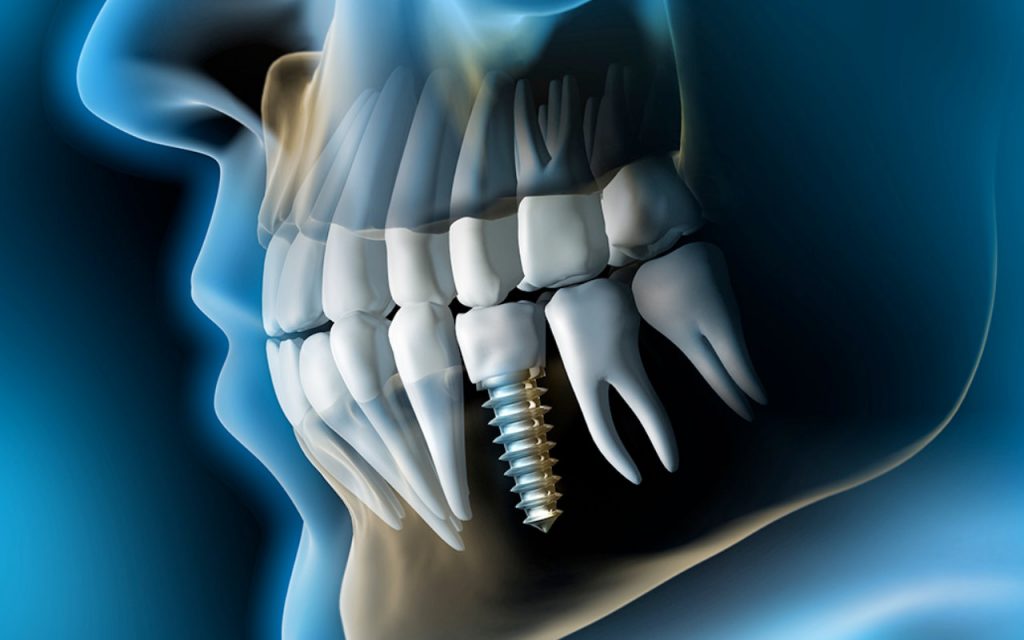Dental Implants
What are dental implants?
An implant is made up of an artificial titanium root that is fixed to the jawbone, with a crown, denture or bridge fitted on top. They can be made to look and feel just like natural teeth. If you are concerned about your replacement teeth looking unrealistic or coming loose, implants are an ideal option.

Why might I need an implant?
Although we work with our patients to help maintain their teeth and their oral health, we can also help with solutions for missing teeth.
A dental implant is a fixed solution for one or more missing teeth as an alternative to a denture (false teeth) or bridges.
Implants also safeguard your overall dental health. Replacing missing teeth is extremely important, as missing teeth cause bone loss which can age your face, and could potentially cause adjacent teeth to become loose too.
The benefits of implants
- Implants are fixed, and are made to look and feel just like natural teeth.
- Implants don’t damage your other healthy teeth.
- Implants won’t come loose or fall out if properly maintained.
- Implants can out last dentures and bridges if maintained with good oral hygiene.
- Implants prevent ageing bone loss, by stimulating your bone structure and stabilising the surrounding teeth.
- Implants offer far superior comfort and do not affect speech when compared to removable dentures (false teeth), as well as improving your ability to chew and taste food.
What types of implants are there?
Single dental implant
An implant is a great choice for a single missing tooth, and the results can be life-changing. A single implant provides the fixed foundation for a crown, which will be created to match your teeth exactly.
Multiple dental implants
If you’re missing more than one tooth, there are a number of options available to you. Depending on the case, a single implant may be able to support two teeth, or two (or more) implants may be used to support a fixed bridge.
Implant secured dentures
Implants can be placed to anchor dentures ensuring a good fit, excellent retention and reduced bulk. This can be especially useful if you find traditional dentures difficult to wear.
How does the process work?
Implants can be placed to anchor dentures ensuring a good fit, excellent retention and reduced bulk. This can be especially useful if you find traditional dentures difficult to wear.
Consultation
The first step is a comprehensive consultation with our highly experienced implant dentist who will be performing your treatment. They will discuss all the options with you, make an assessment of the best solution for you, and ensure you understand every step of your proposed treatment. You will also have an x-ray (in some cases we may need to refer you for a CT scan) to help visualise your jaw. After this visit you will be provided with a detailed treatment plan.
Treatment
This is when the implant is placed into your jaw. It’s a straightforward process which can be completed under local anaesthetic.
The implants will need three to six months to heal and integrate with your jaw bone. This is essential to provide a solid foundation for the crown or bridge.
Once the implant has integrated with your jaw bone, your dentist will take an impression of your mouth. This enables a dental technician to build your bespoke crown or bridge, which will be colour matched to blend with your other teeth.
Dental implant aftercare
How do I look after my implant?
As with natural teeth, good oral hygiene is important for preventing gum disease and prolonging the life of your implants. You need to clean your implants as you would your natural teeth. Regular appointments with the dentist and hygienist, will help to ensure your mouth stays healthy and your implants last as long as possible.
Contact us to find out more about dental implants and make an appointment for a consultation today.
Book an Appointment
If you’re having tooth problems and whether you’re a patient with us or not, you can book an appointment now.